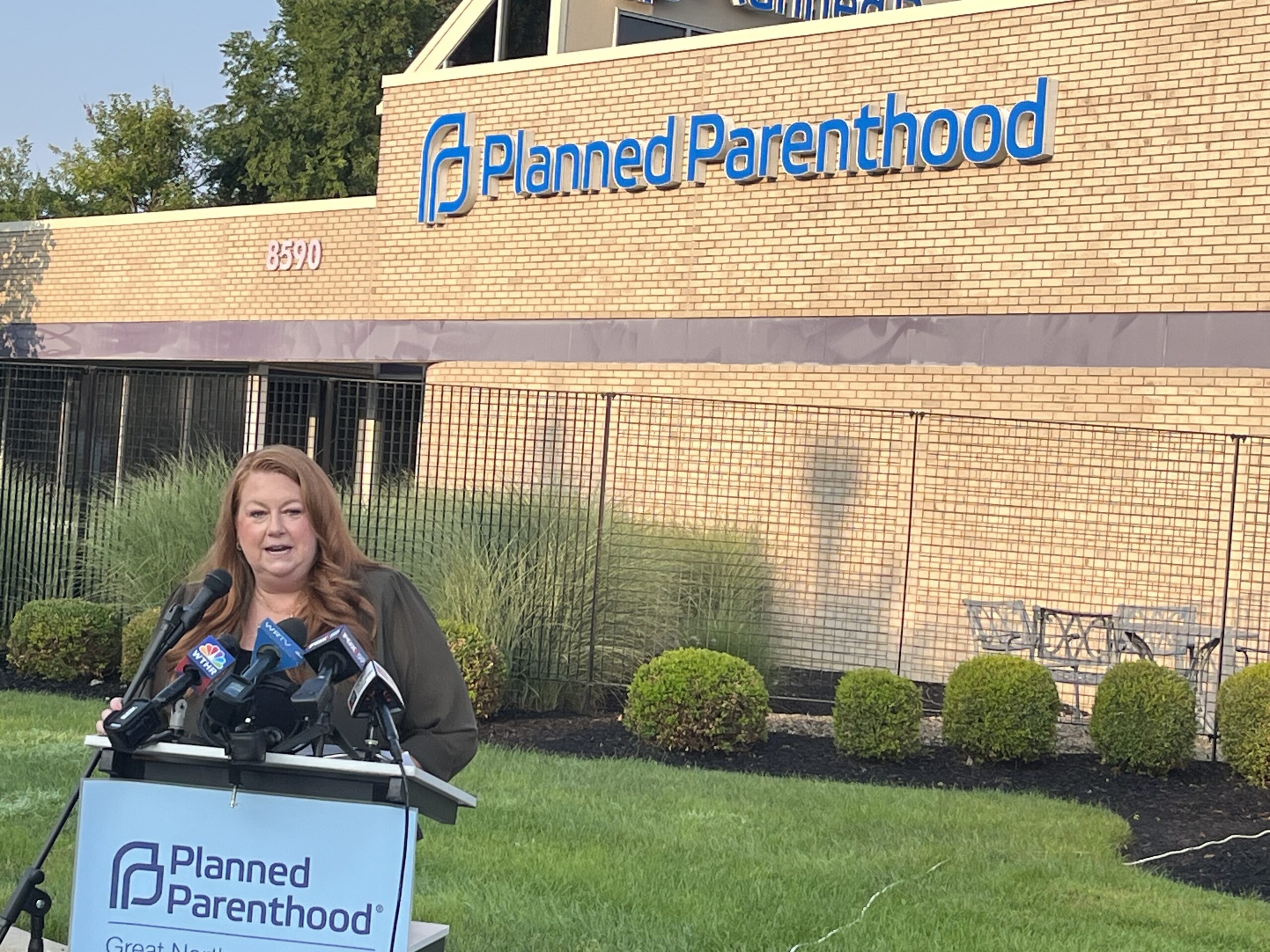Stay ahead of the curve as a political insider with deep policy analysis, daily briefings and policy-shaping tools.
Request a DemoAbortion providers back in court seeking broader ban exceptions

Rebecca Gibron, the CEO of Planned Parenthood’s Indiana affiliate, speaks during a news conference outside the organization’s northwest Indianapolis clinic on Aug. 1, 2023 (Credit: Tom Davies)
Abortion providers are looking to use an opening from the Indiana Supreme Court in seeking to broaden the health exceptions allowed to the state’s near-total abortion ban.
The American Civil Liberties Union of Indiana filed an updated legal challenge Thursday to the abortion ban — a little more than four months after the Supreme Court rejected a broad challenge to the ban’s constitutionality.
The Supreme Court allowed enforcement of the ban to start in August, while saying in its decision that the state constitution “generally permits the General Assembly to prohibit abortions which are unnecessary to protect a woman’s life or health.”
What’s new in arguments against abortion ban
The new ACLU challenge filed with a Monroe County court argues that the ban’s health exceptions are too narrow to abide by the constitution’s Article 1, Section 1 life and liberty protections.
“By allowing abortions only in the most extreme circumstances, where the patient’s pregnancy poses a risk of “death or a serious risk of substantial and irreversible physical impairment of a major bodily function,” S.B. 1 violates the right to protect oneself from serious health risks guaranteed by Article 1, Section 1,” said the legal filing on behalf of Planned Parenthood’s Indiana affiliate and other abortion providers.
The law approved by the Republican-dominated Legislature in 2022 bans abortions at any stage except in cases of rape or incest before 10 weeks post-fertilization, or to protect the life and health of the mother up to 20 weeks of pregnancy. It also voided the state licenses of all Indiana abortion clinics, allowing abortions only in hospitals or hospital-owned surgery centers.
The office of state Attorney General Todd Rokita, which has defended the ban in court, did not immediately comment Thursday on the new filings.
Preliminary injunction being sought
The ACLU filings seek a preliminary injunction lifting the ban on abortion clinic licenses, arguing that so few hospitals provide abortions that access is severely limited even in circumstances that meet the law’s exceptions.
It also asks a judge to expand the ban’s health exceptions to include mental health and recognize numerous health risks that can be exacerbated by pregnancy.
“This lack of clarity chills doctors from providing abortions necessary to treat these serious health risks until they worsen to the point of being life threatening, when it may be too late to save a patient’s life,” an ACLU court filing said.
Where the Supreme Court stands
The Supreme Court has left unresolved how broad the health exceptions needed to be from the ban.
Chief Justice Lorreta Rush wrote in one opinion that she believed the state constitution “could protect a woman’s right to obtain an abortion under circumstances that extend beyond the current law.”
“I am deeply concerned about Senate Bill 1’s impact on Hoosier women’s constitutional right to seek medical care that is necessary to protect their life or to protect them from a serious health risk,” Rush wrote. “And I am likewise concerned about the law’s impact on health care providers who must determine whether to provide that care and potentially expose themselves to criminal penalties and professional sanctions.”
What happens next?
The new ACLU filings are pending before Owen County Judge Kelsey Hanlon, special judge in the case filed in Monroe County. Hanlon issued a preliminary injunction last year blocking the ban from taking effect after ruling that the ban likely violated the state constitution’s privacy protections.
Hanlon’s injunction was later overturned by the Supreme Court with its decision in June.
The organizations involved in the lawsuit — Planned Parenthood, the ACLU of Indiana, All-Options, the Lawyering Project, and Women’s Med — said in a joint statement that their “fight isn’t over in Indiana.”
“We are hopeful that the court will grant our request, ensuring that Hoosiers in the most vulnerable circumstances can still access care in their state,” the groups said. “While this would be a critical step forward for reproductive freedom, it would not restore access for most people seeking abortion in Indiana.”
Tom Davies is a Statehouse reporter for State Affairs Pro Indiana. Reach him at [email protected] or on X at @TomDaviesIND.
X @StateAffairsIN
Facebook @stateaffairsin
Instagram @stateaffairsin
LinkedIn @stateaffairspro
Header image: Rebecca Gibron, the CEO of Planned Parenthood’s Indiana affiliate, speaks during a news conference outside the organization’s northwest Indianapolis clinic in August. (Credit: Tom Davies)
